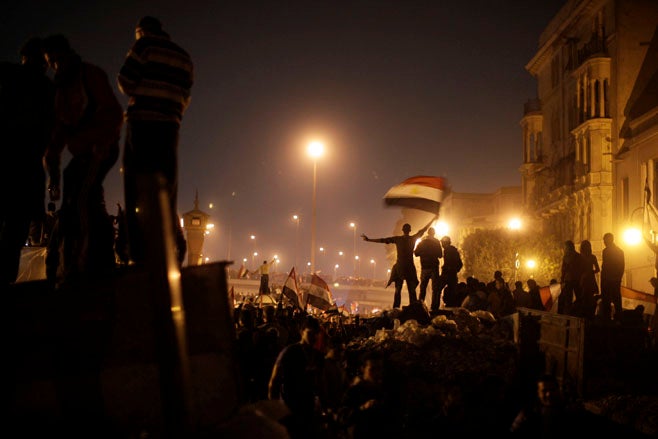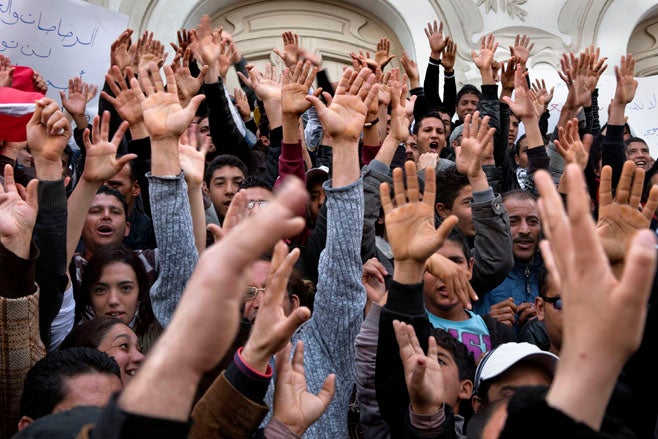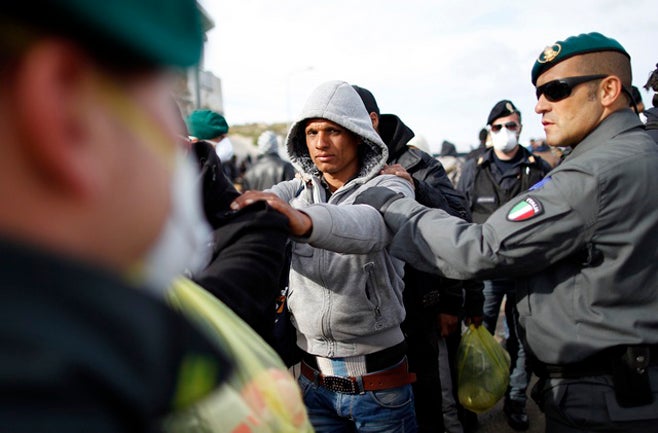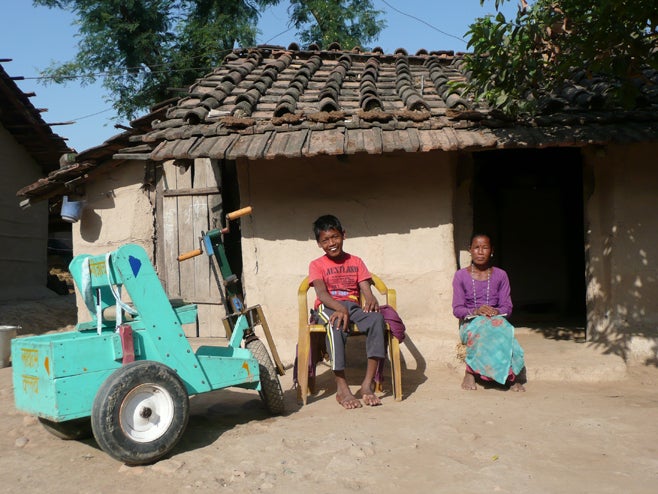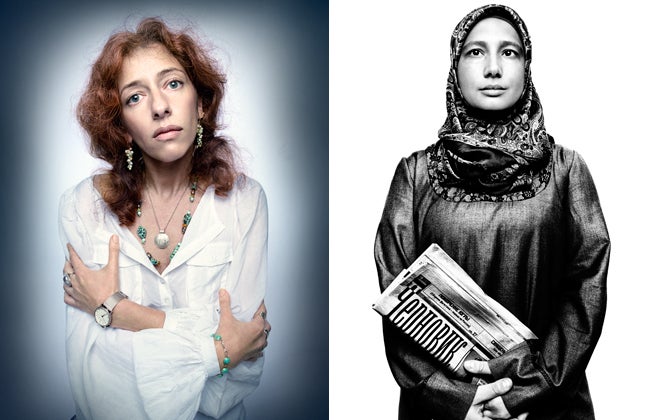Azerbaijan’s human rights record deteriorated in 2011. The government cracked down on all forms of protest and imprisoned dozens of youth activists after sham trials. Although the number of government-initiated criminal and civil libel cases against journalists decreased, the atmosphere for journalists and other critics remained hostile. The government’s so-called beautification campaign in central Baku, the capital, resulted in forced evictions and illegal demolitions. Restrictions on freedom of religion and torture and ill-treatment in custody also persisted.
Azerbaijan continued to deny access to the country for the Council of Europe Parliamentary Assembly rapporteur on political prisoners in Azerbaijan.
Freedom of the Media
The Institute for Reporters’ Freedom and Safety, a local media monitoring organization, reported that more than 50 domestic and foreign journalists were harassed or attacked in 2011. In March six masked men abducted and beat Seymur Haziyev, a journalist for the pro-opposition daily Azadlig, warning him to stop writing articles criticizing the authorities. In April, three unidentified assailants kidnapped Azadlig reporter Ramin Deko, held him for eight hours, and warned him against using social media to criticize the government. Police failed to effectively investigate the attacks.
In October a court remanded Khural newspaper editor-in-chief Avaz Zeinalli to three months pre-trial custody on dubious extortion charges. Earlier in October a court ordered the seizure of Khural’s office equipment to pay fines imposed in three defamation cases brought by the head of the presidential administration and other officials against the newspaper in 2009.
In April police prevented a Swedish television crew from covering a protest by taking their cameras and deleting all footage. In July officials deported Bloomberg Markets photographer Diana Markosian from the Baku airport. In June four men assaulted American freelance writer Amanda Erickson and British human rights activist Celia Davies, breaking Davies’s arm. Two alleged assailants now face criminal charges.
Despite repeated calls from Azerbaijan’s international partners for the government to decriminalize libel and refrain from using criminal and civil libel charges against critical voices, officials initiated seven libel cases against journalists and others in the first half of 2011; at least two resulted in imprisonment.
In May the authorities released Eynulla Fatullayev, a prominent editor and government critic, who was imprisoned in 2007 on politically motivated charges, and whose release the European Court of Human Rights had ordered in April 2010.
Freedom of Assembly
The government severely restricted freedom of assembly. Officials did not authorize any demonstrations in central Baku and police quickly and often violently dispersed unauthorized protests.
The government cracked down on a series of protests inspired by the pro-democracy Arab Spring movements. Police detained more than 50 activists in March after a two-day protest. The courts tried dozens in closed late night trials, sentencing activists for up to 10 days.
In an unauthorized rally on April 2, police physically obstructed protesters from gathering and detained over 200 people—including public figures, journalists, and opposition activists—fourteen of whom were sentenced in unfair trials to up to three years imprisonment. On April 17, police again forced demonstrators away from a protest site, detained more than 100 people and prosecuted dozens on misdemeanor charges.
Political Prisoners
Imprisonment on politically motivated charges is a continuing problem. In the first six months of 2011, local human rights activists counted between 23 and 45 political prisoners, including several activists involved in the March and April protests.
In March police detained youth activist Bakhtyar Hajiyev, 29, in advance of a protest planned for March 11, which he had promoted through social media. In a politically motivated trial, Hajiyev was sentenced to two years in prison for military draft evasion, although he had asked to perform alternative service, as permitted by law.
Also in March social media activist and opposition Popular Front party member Jabbar Savalanli, 20, was sentenced to two-and-a-half years in prison on bogus drug possession charges. In the days leading up to his arrest he had posted comments online criticizing the government.
The authorities still refuse to grant a visa to the Council of Europe Parliamentary Assembly’s rapporteur on political prisoners in Azerbaijan, who has never been allowed to visit Azerbaijan since being appointed in March 2009.
Ill-Treatment and Deaths in Custody
Torture and ill-treatment continue with impunity and two men died in police custody in 2011. In the first half of 2011 the Azerbaijan Committee against Torture, an independent prison monitoring group, received 89 complaints alleging ill-treatment in custody.
In January Elvin Askerov, 31, died following a police chase and his subsequent detention. Police allege he was bruised during the chase. Askerov’s family believes he was beaten in Baku’s Nizami District police station. Despite the family’s request, no investigation followed.
Turac Zeynalov, 31, was detained on August 24 on espionage charges and later died in the custody of the Ministry of National Security of the Nakhichevan Autonomous Republic. Relatives who visited Zeynalov the day after his detention stated that he appeared to have been beaten and could not move. He died three days later. Officials claim that he died of skin cancer. The authorities opened an investigation. In September security ministry officials detained and deported a Radio Free Europe Azerbaijani Service correspondent investigating Zeynalov’s death.
Forced Evictions and Illegal Demolitions
Since 2009, citing city “beautification,” the Baku mayor’s office has evicted hundreds of residents—sometimes using force—and demolished their homes. Homeowners often receive compensation well below market value and have few options for legal recourse.
Evictions were also used to harass human rights defenders. On August 11, violating a court injunction, the authorities demolished without warning a building owned by human rights defender Leyla Yunus that served as an office for Yunus’s Institute for Peace and Democracy, the Azerbaijani Campaign to Ban Landmines, and the only women’s crisis center in Baku. Yunus had repeatedly criticized the government’s demolition campaign.
Freedom of Religion
The government tightened restrictions on all religious groups, dramatically increasing fines for unauthorized religious activity and requiring all religious groups to seek prior authorization from the government to gather after the June 2010 amendments.
In June police dissolved a private meeting of 40 Jehovah’s Witnesses in Ganja, detaining and questioning attendees for up to 10 hours. A court fined three for violating regulations on religious meetings. The same day police raided the Baptist congregation in Sumgait, warning the leader not to meet for worship without state permission. The Ganja community of Jehovah’s Witnesses has unsuccessfully attempted to register at least twice since June 2010.
In December 2010 the government banned women from wearing head scarves in schools and universities, leading thousands to drop out. In October a court convicted five people of organizing unsanctioned protests and resisting police during a May demonstration against the head scarves ban, imprisoning them to up to two-and-a-half years.
In January 2011, officials arrested Movsum Samadov, leader of an outlawed Islamic party, after a speech was posted on YouTube in which he denounced President Ilham Aliyev. In October he was convicted to 12 years imprisonment for an attempted coup.
Human Rights Defenders
In August a court sentenced Vidadi Isganderov, head of the human rights organization Support for Protection of Democracy,to three years in prison on dubious charges of interference with the November 2010 parliamentary elections. The authorities charged Isganderov a few months after he filed a complaint alleging vote rigging in the district in which he ran for parliament. Isganderov also served short sentences in April after two arrests for participating in unsanctioned rallies.
Several human rights lawyers faced politically motivated disciplinary and criminal actions and the government interfered with the work of human rights groups. In August, following a complaint by a police chief, Azerbaijan’s Bar Association suspended Khalid Bagirov, who represented the family of Elvin Askerov who died in police custody in January. Another lawyer, Elchin Namazov, was permanently disbarred and faces criminal sanctions.
In March the Justice Ministry suspended the Azerbaijan Human Rights House, a member of the International Human Rights House Network and a registered organization that served as a training and resource center and conference venue for local groups. Also in March the ministry ordered the National Democratic Institute (NDI) to suspend activities in Azerbaijan pending registration. Since 2006, authorities have denied NDI’s repeated registration attempts.
The Ministry of Justice again refused registration to the Media Monitoring Institute, which has unsuccessfully attempted to register six times since 2009.
In March in Ganja, Azerbaijan’s second largest city, local officials and police, without explanation, evicted from their offices three NGOs: the Regional Center for Development of Democratic Education, Demos, and the Election Monitoring and Democracy Studies Center.
Key International Actors
While the European Union, United States, and other international and regional institutions and partners criticized Azerbaijan’s human rights record, they failed to condition their engagement on concrete human rights improvements.
The EU, the Organization for Security and Co-operation in Europe (OSCE), and the US Embassy in Baku all expressed concern over the arrests of youth activists.
In May the European Parliament adopted a resolution expressing “deep concern at the increasing number of incidents of harassment, attacks and violence against civil society and social network activists and journalists in Azerbaijan.” The same month Catherine Ashton, EU High representative for foreign affairs and security policy/ vice-president of the European Commission, issued a statement expressing concern about the convictions of Jabbar Savalanli and Bakhtyar Hajiyev.
On August 16 the UN high commissioner for human rights criticized the destruction of Leyla Yunus’s property and called on the government to ensure safe working conditions for human rights defenders. The EU and the US Mission to the OSCE also objected to the demolition.
In a September observation on human rights in Azerbaijan, Thomas Hammarberg, Council of Europe commissioner for human rights, criticized the authorities for failure to adequately protect freedom of expression, association, and assembly.
